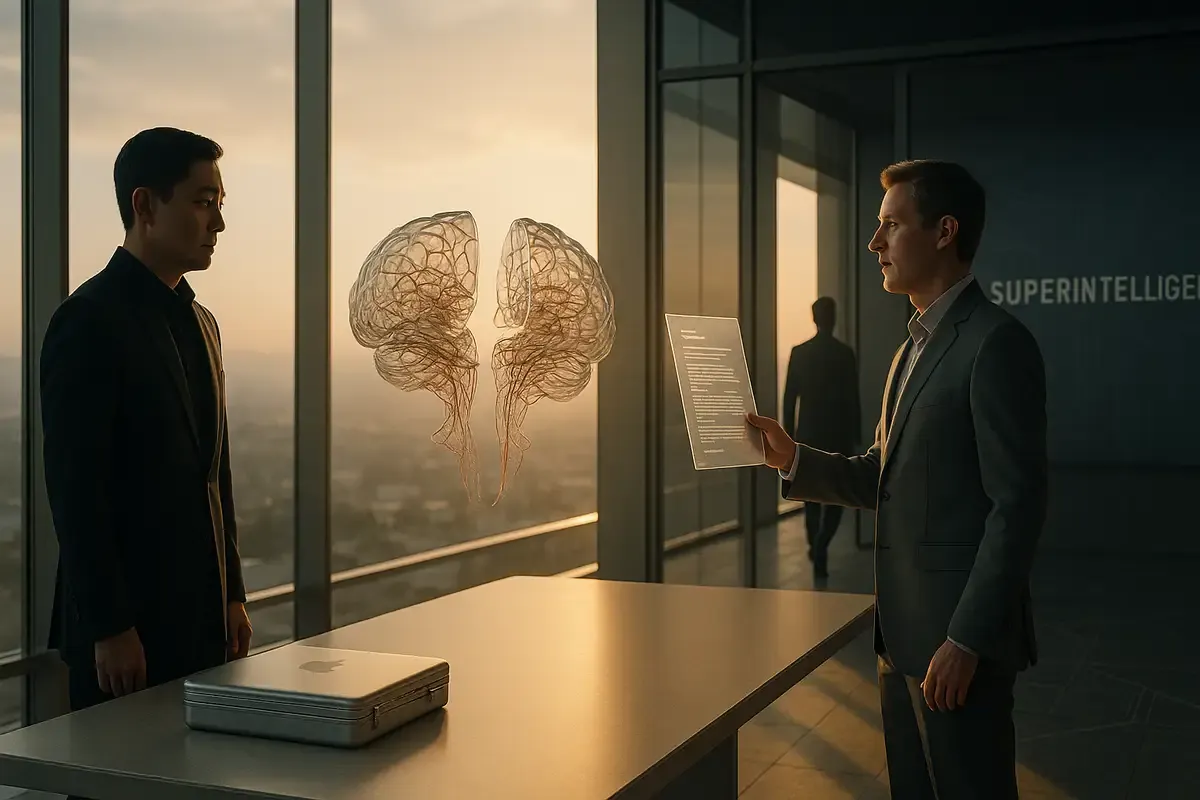Good Morning from San Francisco,
Meta just bought Apple's AI brain. Ruoming Pang, who built the models behind Apple Intelligence, jumped ship for tens of millions annually.
Zuckerberg turned talent acquisition into warfare. He calls prospects personally. Hosts dinners at his house. Writes checks that make competitors cry.
Apple's response? Considering outsourcing Siri to OpenAI instead of building internally. Nothing says "we're winning AI" quite like shopping your flagship product to rivals.
More Apple engineers eye the exits. Meta's new "superintelligence" division needs bodies. The talent war just went nuclear.
Stay curious,
Marcus Schuler
Apple Loses Top AI Executive to Meta's Talent Raid
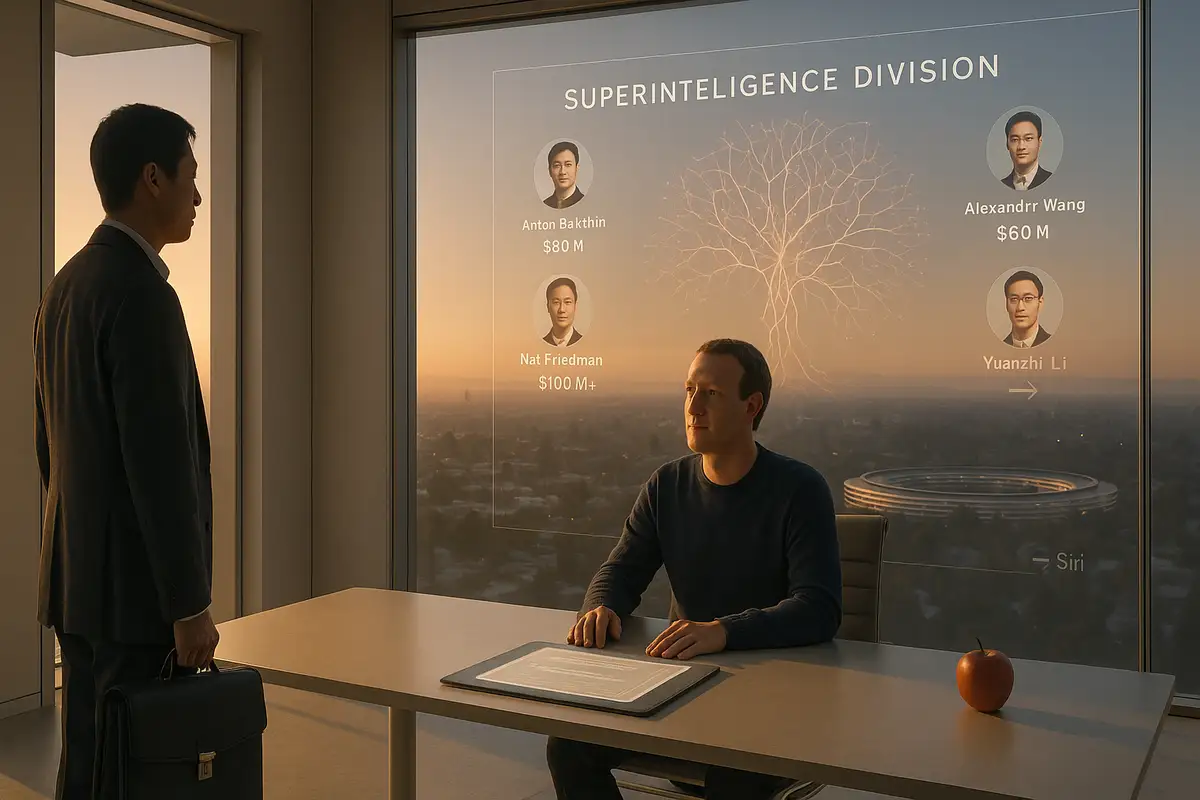
Meta just hired Apple's most important AI executive. Ruoming Pang, who ran Apple's 100-person foundation models team, jumped to Meta for tens of millions per year.
The timing stings. Pang built the AI models powering Apple Intelligence - from email summaries to Genmoji. He joined Apple from Google in 2021 and became the architect behind Apple's AI push.
Mark Zuckerberg has turned AI recruitment into a contact sport. He hosts potential hires at his homes. He calls them directly. And he writes checks that make other companies wince.
Meta just reorganized around a new "superintelligence" division. The goal: build AI that matches human performance. Zuckerberg hired Scale AI's CEO after investing in his company at a $29 billion valuation.
The shopping spree continues. Meta grabbed researchers from OpenAI and Anthropic. Some packages reach $100 million.
Apple's struggles make this worse. The company has been debating whether to outsource Siri to OpenAI instead of using internal models. Those discussions soured morale on Pang's team.
More departures loom. Several engineers are considering offers from Meta and others. Tom Gunter, Pang's deputy, already left last month.
Why this matters:
• The AI talent war is becoming zero-sum - losing key people means falling behind competitors who pay absurd sums
• Apple's willingness to consider outside AI suggests building competitive models internally is harder than expected
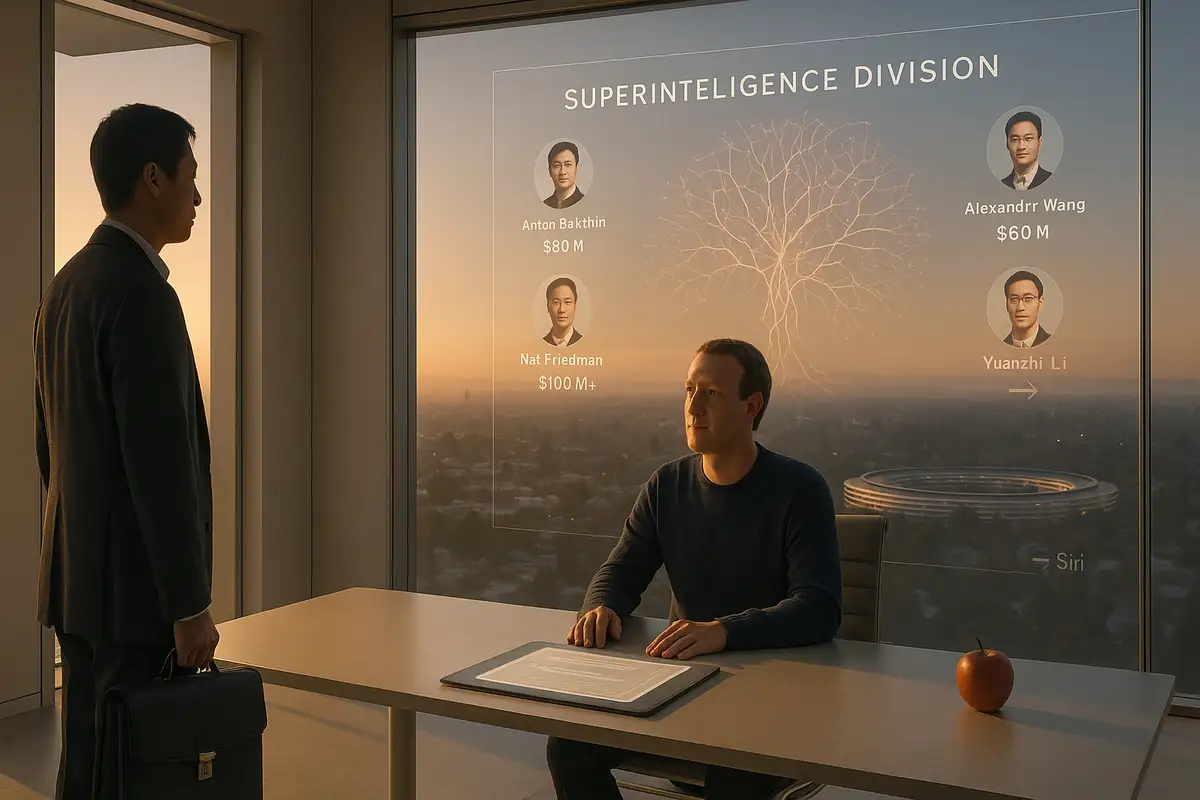
AI Image of the Day

Prompt:
A purple and blue paper art installation of Van Gogh's "Starry Night," with long, flowing ribbons of silk in shades of violet and indigo. The background is an outdoor courtyard decorated with yellow stars on green plants and flowers. It features a front view with close-up shots of the entire artwork. This piece showcases vibrant colors and intricate details that create a stunning visual experience. In detail, it highlights the style of Van Gogh.
DeepSeek spooked OpenAI into spy-level security mode
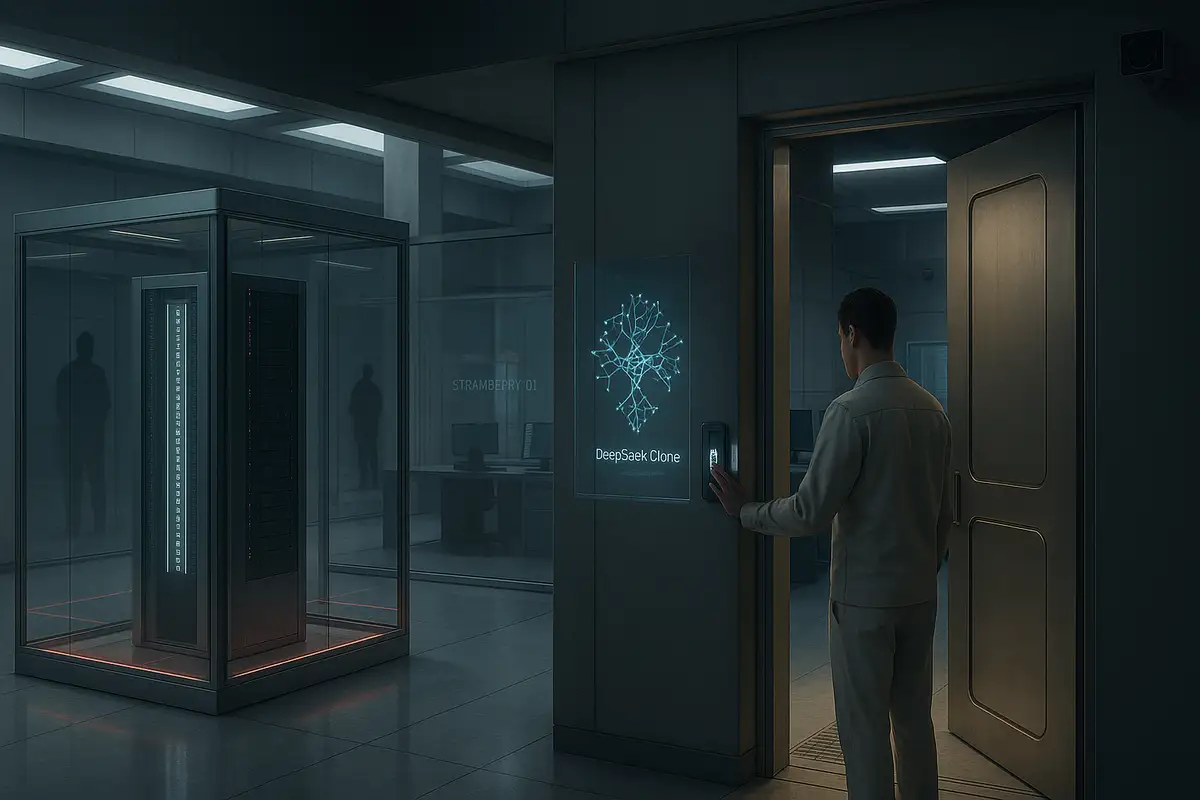
OpenAI went full fortress mode. Chinese startup DeepSeek allegedly copied its AI models in January using "distillation" - reverse engineering by studying outputs. OpenAI's response? Turn offices into spy agencies.
Employees now scan fingerprints to enter certain rooms. Workers need clearance checks before discussing projects in hallways. The company calls it "information tenting" - digital compartments limiting access to sensitive work.
When OpenAI built its o1 model (codenamed "Strawberry"), staff had to verify colleagues were "in the tent" before talking shop. One employee called it "very tight - you either had everything or nothing."
OpenAI moved crown jewel algorithms into isolated systems that never touch the internet. Nothing connects to outside networks without explicit approval. The company hired security chief Dane Stuckey from Palantir and added retired NSA director Paul Nakasone to its board.
This isn't just about foreign threats. Sam Altman's comments regularly leak. The AI industry's brutal talent wars create constant poaching risks.
Other companies are watching closely. If the industry leader needs spy-level security, competitors will likely follow suit.
Why this matters:
• AI development is shifting from open collaboration to armed camps, potentially slowing innovation while concentrating power among companies that can afford military-grade security.
• Distillation techniques make copying AI models easier than ever, forcing the entire industry to choose between sharing knowledge and protecting competitive advantages.
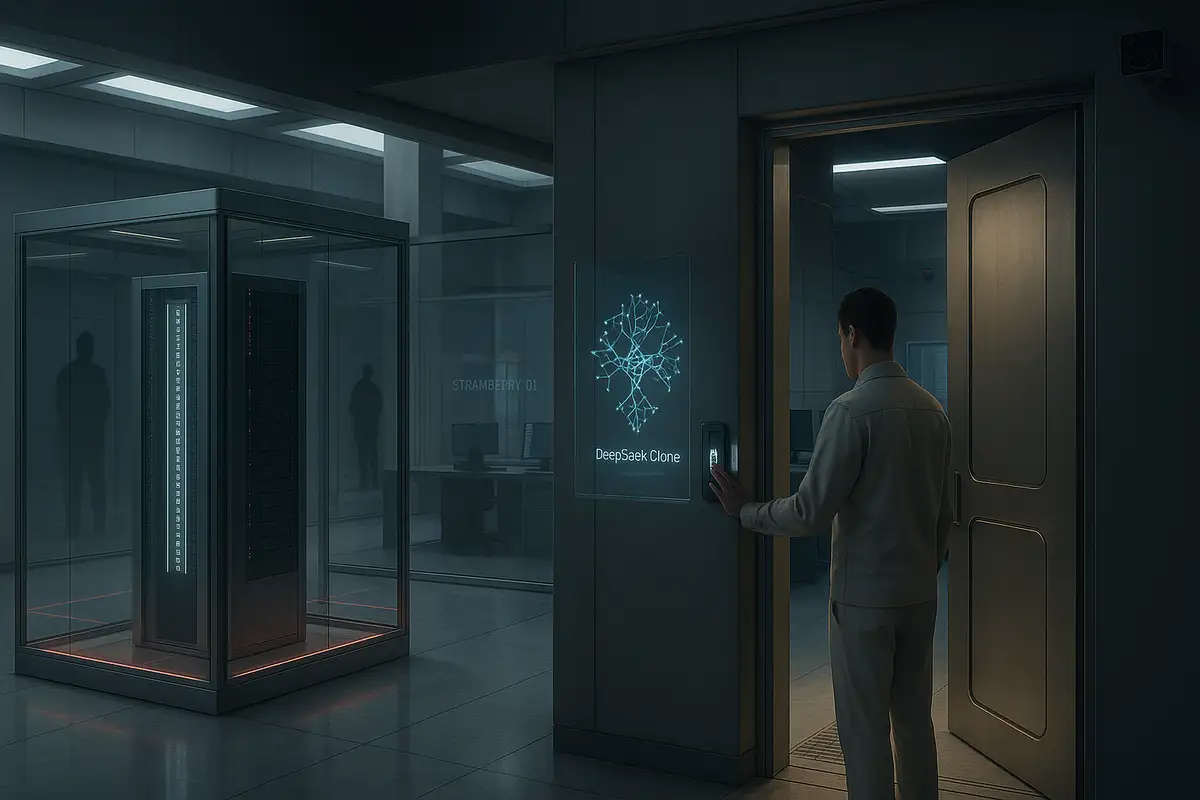
Better prompting...
Today: Improve security for remote workers
Write a step-by-step VPN setup guide for remote workers.
Cover how to choose secure protocols (WireGuard, OpenVPN), configure client software on Windows/Mac/mobile devices, and verify the connection works properly.
Include specific settings for strong encryption, DNS leak prevention, and kill switches.
Focus on practical steps someone can follow without deep technical knowledge.
AI & Tech News
Samsung Blames China AI Chip Curbs for 56% Profit Plunge
Samsung projected a 56% plunge in second-quarter operating profit to 4.6 trillion won, far below the 6.2 trillion won analysts expected, blaming US restrictions on advanced AI chip sales to China. The world's biggest memory chipmaker also faces delays in supplying high-bandwidth memory chips to key customer Nvidia, while rivals SK Hynix and Micron cash in on the AI boom by focusing on US demand.
Epic Drops Samsung Lawsuit Just Before New Galaxy Phones Launch
Epic Games dropped its lawsuit against Samsung two days before the phone maker's big Galaxy announcement, saying they reached a settlement over Samsung's app store blocking features. Epic won't say what Samsung agreed to do, leaving everyone to guess whether the company will actually change the "Auto Blocker" feature that sparked the legal fight.
Jack Dorsey Builds Weekend Messaging App That Actually Works Offline
Jack Dorsey spent his weekend building Bitchat, a messaging app that works entirely through Bluetooth without internet, servers, or user accounts, operating within a 30-meter range using mesh networking to hop messages between devices. The app stores messages only in device memory where they disappear by default, targeting scenarios like protests, disasters, or areas where internet access fails—essentially turning your phone into a very expensive walkie-talkie.
Microsoft and OpenAI Fund Teacher Training Center for Their Own Products
The American Federation of Teachers will use $23 million from Microsoft, OpenAI, and Anthropic to create a national AI training center in New York City, teaching educators how to use the same chatbots those companies want to sell to schools. The arrangement comes as tech firms push to embed their AI tools in classrooms nationwide, despite research showing these chatbots can produce misinformation and may hinder students' critical thinking skills.
UAE Home-Buying App Huspy Raises $59M to Expand Across Europe
UAE proptech Huspy closed a $59 million Series B led by Balderton Capital to expand its digital home-buying platform across Europe and launch in Saudi Arabia. The Dubai-based startup, which claims 30% of the UAE mortgage market by connecting freelance agents with property leads and mortgage products, has already entered six Spanish cities with over 20x year-on-year growth.
British Retailer Seeks FBI Help as Cyber Attack Costs £300 Million
Marks and Spencer enlisted FBI support after Russian-speaking cyber criminals knocked its online clothing and furniture sales offline for seven weeks, costing the retailer up to £300 million in operating profits. Chair Archie Norman told MPs the attack by Dragon Force hackers felt "like an out-of-body experience" and called for mandatory reporting of major cyber attacks after discovering two recent attacks went unreported.
Italy Arrests Chinese Hacker Accused of Stealing Covid Vaccine Secrets
Italian police arrested Chinese citizen Xu Zewei at Milan's Malpensa airport on a US warrant alleging he helped hack American Covid-19 vaccine research during the pandemic's peak in 2020. The arrest puts Italy's Prime Minister Giorgia Meloni in an awkward diplomatic spot between Washington and Beijing, especially with her deputy set to visit China this week.
Bluesky Finally Gets the Bell Icon That Makes News Actually Followable
Bluesky rolled out activity notifications that let users toggle a bell icon on profiles to get alerts when specific accounts post, filling a gap that made following breaking news awkward compared to other platforms. The feature includes granular controls for notifications and comes as Bluesky pushes to grow its sports coverage, though star NBA reporter Shams Charania hasn't made the jump yet.
Amazon Sellers Skip Discounts as Tariffs Crash the Sale Party
Amazon's Prime Day faces its biggest buzzkill yet as sellers ditch discounts they can't afford under Trump's tariffs, with some brands sitting out the sale entirely while others slash their usual markdowns. One survey found a quarter of shoppers plan to skip the event because of tariff-driven price concerns, turning what was supposed to be a discount bonanza into a cautious shopping experiment.
🧰 AI Toolbox
How to Clone Your Voice to Create Human-like Voice Overs
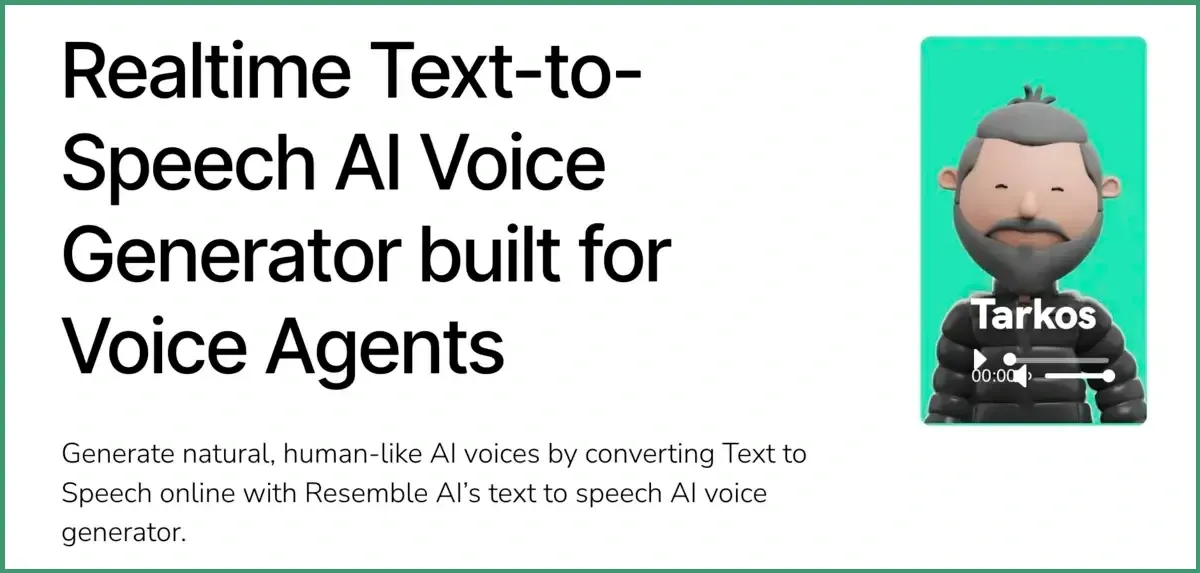
Resemble.ai creates a digital copy of your voice that sounds exactly like you. You record a few sentences to train the AI, then it can speak any text in your voice. You can also adjust the emotion and pace of the speech.
Tutorial:
- Sign up for a Resemble.ai account
- Choose to use a pre-built voice or clone your own
- If cloning, record sample sentences to train the AI
- Once ready, type the text you want spoken
- Adjust emotion, pitch, and pacing settings
- Generate the audio and download as MP3 or WAV
- Use the voice over in videos, podcasts, or other projects
🚀 AI Profiles: The Companies Defining Tomorrow

Anubis: Digital Bouncer Saves the Web
Montreal engineer Christine Dodrill got hammered by Amazon's scrapers in early 2025. She built Anubis – an open-source firewall that makes bots solve math puzzles while humans get greeted by a cute cartoon jackal. 🐺
1. The Founders
• Founded: January 2025 by Christine Dodrill ("Xe Iaso"), Montreal
• Team: Solo developer under Techaro indie outfit
• Why: Amazon bots crushed her Git server, ignored robots.txt
• Scale: 8,800+ GitHub stars, 200,000+ downloads in six months
2. The Product
• Core tech: JavaScript proof-of-work challenges via reverse proxy
• Strengths: Lightweight (128MB RAM), multi-threaded, Go-powered
• What it does: Blocks AI scrapers, lets humans through after 1-2 second puzzle
• Bonus: Anime jackal mascot celebrates successful humans 🇨🇦
3. The Competition
• Cloudflare: Commercial giant with "AI Labyrinth" honeypot feature
• Nepenthes: Open-source trap that feeds bots fake data mazes
• Position: DIY alternative for those who won't use Big Tech solutions
• Users: GNOME Project, Linux Kernel Archives, FFmpeg, UNESCO
4. Financing
• Funding: Zero VC money – pure community support
• Revenue model: MIT License = free software forever
• Backers: Patreon donations, small sponsors like Raptor Computing
• Valuation: Unmeasurable – success counted in saved servers, not dollars 💰
5. The Future ⭐⭐⭐⭐⭐ Bot wars never end. Dodrill keeps updating Anubis as scrapers evolve new tricks. The arms race guarantees continuous development – and the open-source community loves digital David vs. Goliath stories.



